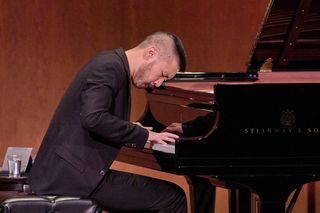|
Back
Conrad Tao’s Notes of Revelations New York
Theresa L. Kaufmann Auditorium, 92nd Street Y
12/18/2021 -
Conrad Tao: Improvisation – Keyed In (New York premiere, commissioned by 92nd St Y)
John Adams:China Gates
Johann Sebastian Bach: Wenn wir in höchsten Nöten sein, BWV 641
Jason Eckhardt: Antennaria plantaginifolia: “Pussytoes”, from A Compendium of Catskill Native Botanicals, Book 2
Robert Schumann: Kinderszenen, Op. 15
Fred Hersch: Pastorale
Ludwig van Beethoven, Piano Sonata No. 31 in A-flat Major Op. 110
Conrad Tao (Pianist)

C. Tao at 92nd St. Y (© Joseph Sinnott)
“A verbal art like poetry is reflective, it stops to think. Music is immediate, it goes on to become.”
W.H. Auden (1907-1973)
“But would you sing, and rival Orpheus’ strain,/The wond’ring forests soon should dance again;/The moving mountains hear the powerful call,/And headlong streams hang list’ning in their fall!”
Alexander Pope (1688-1744), Pastorals
Long before his 30th birthday, an appearance of Conrad Tao is neither a recital or a concert or a program. It becomes an Event. The 92nd St Y Auditorium was not filled, but the enthusiasm of the audience was palpable, the combination of memory and anticipation creating a tangible event, a pre-piano phenomena.
The motivation behind the enthusiasm? Obviously, Mr. Tao hasn’t created a temporary fandom. The reasons behind his fame are not due to his technique (which is so phenomenal that his runs down the scale have the glissando effect of a Stradivarius), or to his especially idiosyncratic choices (for this concert, the two longest works were by Schumann and Beethoven).
Rather, Conrad Tao has the excitement and virtuosity of a 21st Century Liszt. Like Liszt, his improvisations become the most difficult etudes. His mainstream choices are performed with attention to every measure, yet played with a grace and mental acuity. Yet while Liszt was a sexual predator/magnet, Mr. Tao is too unassuming, far more earthy, ready to verbally describe the more enigmatic works.
Except for the one literally magnetic opener. This Improvisation was indeed played with magnets placed in the key-wires. A “prepared piano” David Tudor style? Not at all. The magnets created a resonance on the treble keys. But this was incidental to the crazy virtuosity on the rest of the strings. Not exactly jazzy, but with that Art Tatum sense that only the fingers had any idea where they were going. Mr. Tao’s control was evident, but the audience whirled through a no-man’s-land of notes.
In fact, it made John Adams’ following short China Gates sound more mininalist than ever.
Not so, the following Bach chorale prelude Wenn wir in höchsten Nöten sein (“When we are in dire need”). Who arranged this work? Not Busoni or Liszt. Perhaps it was Mr. Tao himself, for his preferences seem ecumenical. The work was played with that operatic lyrical sense, sometimes dissonant (though with a dissonance that Bach would have approved), with Baroque figurations and–above all–with that inimitable Conrad Tao touch.
I dare not try to spell a work by Jason Eckhardt (but can cut and paste) Antennaria plantaginifolia: “Pussytoes”, from A Compendium of Catskill Native Botanicals, Book 2. After the concert I Googled the plant. And though I saw no exact resemblance, Mr. Eckhardt–who had composed it for the pianist–gave a simulacrum of blossoming and flowering, and gentleness. Offhand, while avian replicas are manifold, this was the first I can recall of flowers.
Both the Bach and Eckhardt were preludes to one of the two substantial works, Schumann’s Scenes of Childhood. Despite W.H. Auden’s quotes above, these thirteen miniatures are poetry. Perhaps songs without words, yet one feels the link of the most Romantic poets,. And while several have their independence as children’s pieces, they form a cohesive circular form of childhood, starting and ending with same mood and same key.
As a whole Mr. Tao presented a lovely picture. Yet he is too much of an artist to ignore the variegated moods, and the dreams, games, chases, ghosts and final “surprise” ending...that the whole work was but the imagination of the writer. It was a gorgeous performance.
A performance resurrected after the intermission by Fred Hersch’s Pastorale dedicated to Robert Schumann. None of the Hersch jazz background was here.This was gentle, lyrical, sometimes 21st Century, sometimes Schumannesque.
The final two pieces–one by Conrad Tao, one by Ludwig van Beethoven–were linked by the fervent bass notes of the piano. Mr. Tao’s Keyed In, co–commissioned by the 92nd Street Y, was a crazy Sturm und Drang, and the pianist’s self-described “love letter to the piano” was an adoration of lowest keys, with an incessant ffff volume–with almost minimalist alterations. They were dense, unnerving, and the changes–with colors, overtones, knocking, with a calculus of pedal changes–were in contrast to the notes in the treble. As well as as a surprise single right-hand note which was like a soft “Benediction” to Mr. Tao’s Dies Irae.
Nothing was idiosyncratic about Beethoven’s A Flat Sonata, nor will I make the fatal error of comparing its profundity with Schnabel or Arrau or Serkin etc etc. “All truth is profound,” said Herman Melville, and the truth of Opus 110 cannot be questioned. Conrad’s understanding of the opening faux improvisation, of the fierce scherzo and–above all–the monumental finale were essayed with Conrad Tao’s touch, his intelligent reading and his understanding that those ending fugues were a buildup of Beethoven’s lights and shadows were obviously mastered by the pianist.
The only drawback was that after the mighty Beethoven, Conrad Tao played an encore. As if he had spread out two hours of glistening jewels–and that he had to tie them up in an egg-crate, a mediocre early work of his that almost turned this into (sigh) a “piano recital.” Happily, his pre-piano splendor retained the more singular word for the evening, an Event.
Harry Rolnick
|